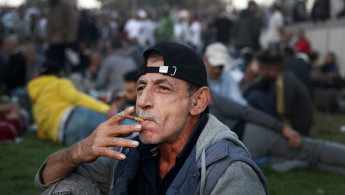After a 10-day ban, Israel reopens Erez crossing for Palestinian workers from Gaza
Israeli authorities reopened the "Erez crossing" on Thursday, 28 September, finally allowing Palestinian workers from the Gaza Strip to reenter Israel's 1948 territories following an "understanding" with Hamas to end border tensions.
The "Erez crossing", the only pedestrian crossing between Gaza and Israel, will remain open "depending on the assessment of the situation and the security stability," Ghassan Alyan, the head of the Office of the Coordination of Government Activities in the Territories (COGAT), said in a press statement.
The opening of the Erez crossing comes after a 10-day closure by Israeli authorities in retaliation to protests by Palestinians along the eastern borders of Gaza.
The demonstrations highlighted several critical issues, such as the presence of Israeli soldiers along the borders, ongoing violations against Palestinian prisoners in Israeli jails and the storming of the Al-Aqsa compound in Jerusalem by fundamentalist Jewish settlers.
Often, Israeli forces respond to these protests by firing tear gas, rubber bullets and live fire, injuring and killing several Palestinian protesters over the past few weeks.
When Israel sealed off the Erez crossing point on 17 September, thousands of Palestinian workers were prevented from getting to their jobs in the 1948 territories and the occupied West Bank.
According to local economists, the closure prevented more than 18,000 Palestinians from earning a living and deprived Gaza's economy of around US$2 million a day.
As soon as news broke that the crossing would be reopened, thousands of workers gathered before its gates, with many forced to spend the night.
A security source close to Hamas, the Islamist group in control of Gaza, said to The New Arab under the condition anonymously that "the unprecedented Israeli decision to reopen the crossing came following indirect an understanding with Hamas to gradually stop the protests along the eastern fence in return for Israel to ease its restrictions on Gaza."
"The understandings came following hard efforts by UN and Egyptian mediators to curb the possibility of a violent escalation in the coastal enclave," the source added. "The Palestinian resistance factions, mainly Hamas, warned Israel, via the mediators, that they will not remain silent for long over Israeli violations in the coastal enclave or the occupied West Bank and Jerusalem."
Officially, Hamas has called off protests along the eastern fence and urged young protesters not to initiate further marches towards the Israeli army along the borders.
Meanwhile, despite news of the negotiation's success, UN Special Coordinator for the Middle East Peace Process Tor Wennesland expressed "deep concerns" about the future.
"I am deeply concerned by the escalating tensions in and around Gaza," Wennesland tweeted on Wednesday. "The situation inside the Strip is dire, and we must avoid another conflict that will have grave consequences for all."
"The people in Gaza have suffered enough, and they deserve more than a return to calm," he added, noting that the UN is working with all concerned to improve the lives of people in Gaza, particularly the most vulnerable.
More than 2.3 million Palestinian people in the Gaza Strip have been living under worsening conditions after Israel imposed an illegal blockade in 2007. Since then, Israel also launched five large-scale military wars against the besieged coastal enclave, killing and wounding thousands of Palestinians.





 Follow the Middle East's top stories in English at The New Arab on Google News
Follow the Middle East's top stories in English at The New Arab on Google News


